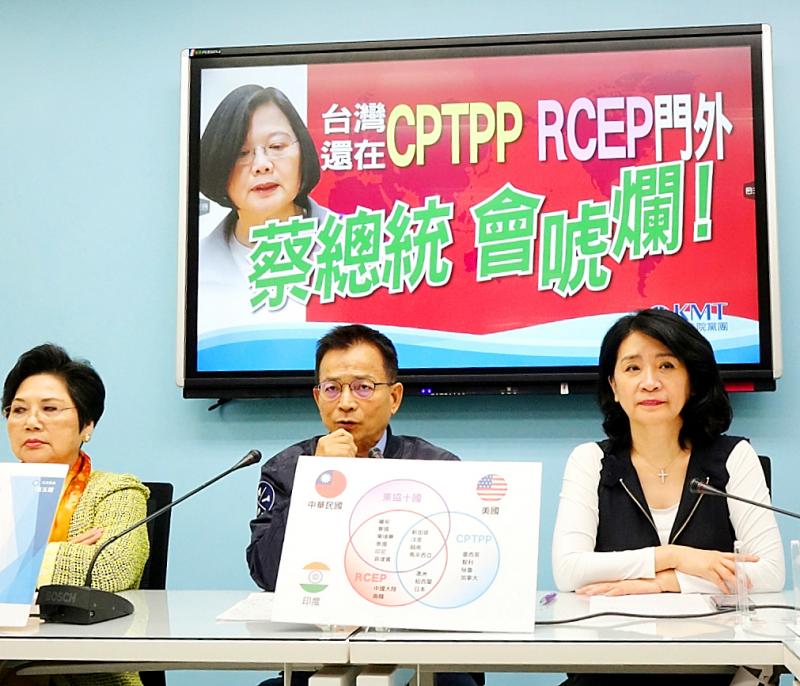Saying that a responsible leader should inform the public about global trade and economic development trends and make the right decision for Taiwan, President Tsai Ing-wen (蔡英文) yesterday defended the government’s actions regarding to the fledgling Regional Comprehensive Economic Partnership (RCEP), which was signed on Sunday by the 10 members of ASEAN plus Australia, China, Japan, South Korea and New Zealand.
The pact is due to take effect in the second half of next year.
In a Facebook post yesterday, Tsai said that Taiwan should develop more opportunities instead of placing all of its eggs in one basket, adding that both the government and private sector have planned for the signing of the RCEP.

Photo: Chu Pei-hsiung, Taipei Times
More than 70 percent of the nation’s exports to RCEP nations already face zero customs tax, she said.
The pact would have limited effect on the nation in the short term, as China imposes customs taxes or has promised to lower such taxes on most goods imported from Japan and South Korea, she said.
The government has helped Taiwanese businesspeople relocate their businesses to Southeast Asian nations through the New Southbound Policy, which has helped increase the market share of Taiwanese products in ASEAN nations, she said.
Tsai and her government have come under fire from the Chinese Nationalist Party (KMT), including KMT Chairman Johnny Chiang (江啟臣), who said that the Democratic Progressive Party (DPP) would have to pay for failing to deliver on a promise to join the pact.
In a Facebook post, Chiang said that Tsai had pledged that Taiwan would join the agreement under her leadership, but she now says that the RCEP is not important.
“The DPP has governed the nation for five years, and Tsai is in her second term. Is she telling people now that all the money and resources her administration has spent in the past five years was so that the nation would join an unimportant economic pact?” he wrote.
Tsai has broken her promise to the people, and the DPP would have to be held accountable, he said, adding that it should not govern the country if it does not want to take responsibility for this matter.
The RCEP covers more than 2 billion people in 15 nations, which account for approximately 30 percent of global GDP, he said.
China and ASEAN are Taiwan’s two largest export destinations, and the nation’s economy would definitely be affected by its exclusion from the RCEP, he said.
Former president Ma Ying-jeou (馬英九) wrote on Facebook that the 2014 Sunflower movement prevented Taiwan and China from signing a cross-strait service trade agreement, which has made it difficult for Taiwan to join the RCEP.
Tsai’s administration has equated joining the RCEP with identifying with China’s “one country, two systems” principle, Ma said.
The DPP is used to blaming China for everything, from deteriorating cross-strait relations to a regional economic partnership, he said.

The US government has signed defense cooperation agreements with Japan and the Philippines to boost the deterrence capabilities of countries in the first island chain, a report by the National Security Bureau (NSB) showed. The main countries on the first island chain include the two nations and Taiwan. The bureau is to present the report at a meeting of the legislature’s Foreign Affairs and National Defense Committee tomorrow. The US military has deployed Typhon missile systems to Japan’s Yamaguchi Prefecture and Zambales province in the Philippines during their joint military exercises. It has also installed NMESIS anti-ship systems in Japan’s Okinawa

TRAGEDY STRIKES TAIPEI: The suspect died after falling off a building after he threw smoke grenades into Taipei Main Station and went on a killing spree in Zhongshan A 27-year-old suspect allegedly threw smoke grenades in Taipei Main Station and then proceeded to Zhongshan MRT Station in a random killing spree that resulted in the death of the suspect and two other civilians, and seven injured, including one in critical condition, as of press time last night. The suspect, identified as a man surnamed Chang Wen (張文), allegedly began the attack at Taipei Main Station, the Taipei Fire Department said, adding that it received a report at 5:24pm that smoke grenades had been thrown in the station. One man in his 50s was rushed to hospital after a cardiac arrest

‘WIN-WIN’: The Philippines, and central and eastern European countries are important potential drone cooperation partners, Minister of Foreign Affairs Lin Chia-lung said Minister of Foreign Affairs Lin Chia-lung (林佳龍) in an interview published yesterday confirmed that there are joint ventures between Taiwan and Poland in the drone industry. Lin made the remark in an exclusive interview with the Chinese-language Liberty Times (the Taipei Times’ sister paper). The government-backed Taiwan Excellence Drone International Business Opportunities Alliance and the Polish Chamber of Unmanned Systems on Wednesday last week signed a memorandum of understanding in Poland to develop a “non-China” supply chain for drones and work together on key technologies. Asked if Taiwan prioritized Poland among central and eastern European countries in drone collaboration, Lin

ON ALERT: Taiwan’s partners would issue warnings if China attempted to use Interpol to target Taiwanese, and the global body has mechanisms to prevent it, an official said China has stationed two to four people specializing in Taiwan affairs at its embassies in several democratic countries to monitor and harass Taiwanese, actions that the host nations would not tolerate, National Security Bureau (NSB) Director-General Tsai Ming-yen (蔡明彥) said yesterday. Tsai made the comments at a meeting of the legislature’s Foreign Affairs and National Defense Committee, which asked him and Minister of National Defense Wellington Koo (顧立雄) to report on potential conflicts in the Taiwan Strait and military preparedness. Democratic Progressive Party (DPP) Legislator Michelle Lin (林楚茵) expressed concern that Beijing has posted personnel from China’s Taiwan Affairs Office to its